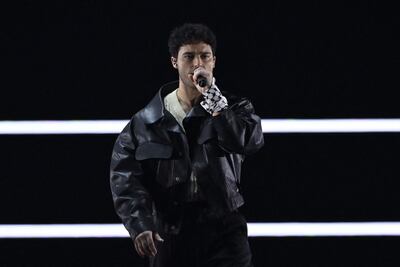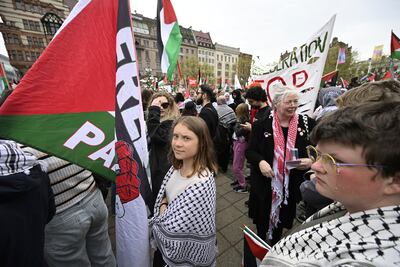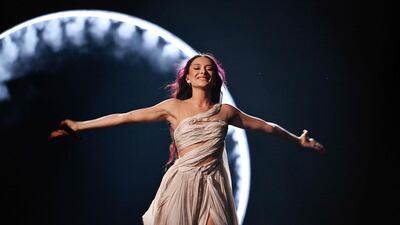Israel reached the grand final of the Eurovision Song Contest as thousands of protesters gathered nearby to call for the country to be disqualified over the Gaza war.
Singer Eden Golan performed her song Hurricane on Thursday night at the second semi-final in Malmo, Sweden, which is hosting the long-running contest this year. Known for its kitschy performances and outlandish costumes, the annual event is watched by millions around the world.
Israel is one of 26 nations that will compete in the final on Saturday, with Golan among the favourites to win. Other popular participants this weekend are Baby Lasagna from Croatia, Ukraine's Alyona Alyona and Jerry Heil, and Nemo from Switzerland.
The members of the European Broadcasting Union, which includes Israel, will vote for the winners. The EBU, which considers itself to be an apolitical organisation, ignored several campaigns calling for Israel to be blocked from participating this year.
Jean Philip De Tender, deputy director general of the EBU, said earlier this week that blocking Israel from the competition "would have been a political decision, as such, which we cannot take".
This year is not the first time Eurovision has been affected by a conflict. Russia was suspended from the EBU and barred from Eurovision in 2022 after its invasion of Ukraine.
In May, the EBU asked Israel to change Golan's original song, October Rain, as it was deemed too political, with some lyrics appearing to allude to the Hamas-led attack on Israel on October 7 that killed about 1,200 people.
On Tuesday, Swedish singer and former Eurovision finalist Eric Saade performed at the opening ceremony wearing a keffiyeh, commonly used by people who want to show support for Palestine.

The move prompted the EBU to issue a statement saying it regretted the politicisation of the competition.
Saade, whose father is of Palestinian descent, said on Instagram that it was "just my way of showing a part of my origin". "I got that keffiyeh from my dad when I was a little boy, to never forget where the family comes from," he added. "Back then, I didn't know it would one day be called a 'political symbol' by EBU."
Ireland's Bambie Thug, who will also compete in the finals, was made to change a message written in face paint that translated to the word "ceasefire".
"It was very important for me because I'm pro justice and pro peace," Bambie Thug said. "Unfortunately, I had to change those messages today to 'crown the witch' only [which was an] order from the EBU."
The next day, several videos surfaced on social media showing Golan being booed during the dress rehearsals. Some people were heard shouting: "Free Palestine."
On Thursday, Swedish climate activist Greta Thunberg joined more than 10,000 protesters in the main square in Malmo to demand Israel be removed from Eurovision and to call for a ceasefire in Gaza.

Protesters waved Palestinian flags and marched through the city chanting slogans including "boycott Israel".
The war has killed more than 39,900 people in Gaza, the enclave's health authorities said.
Additional reporting by agencies

